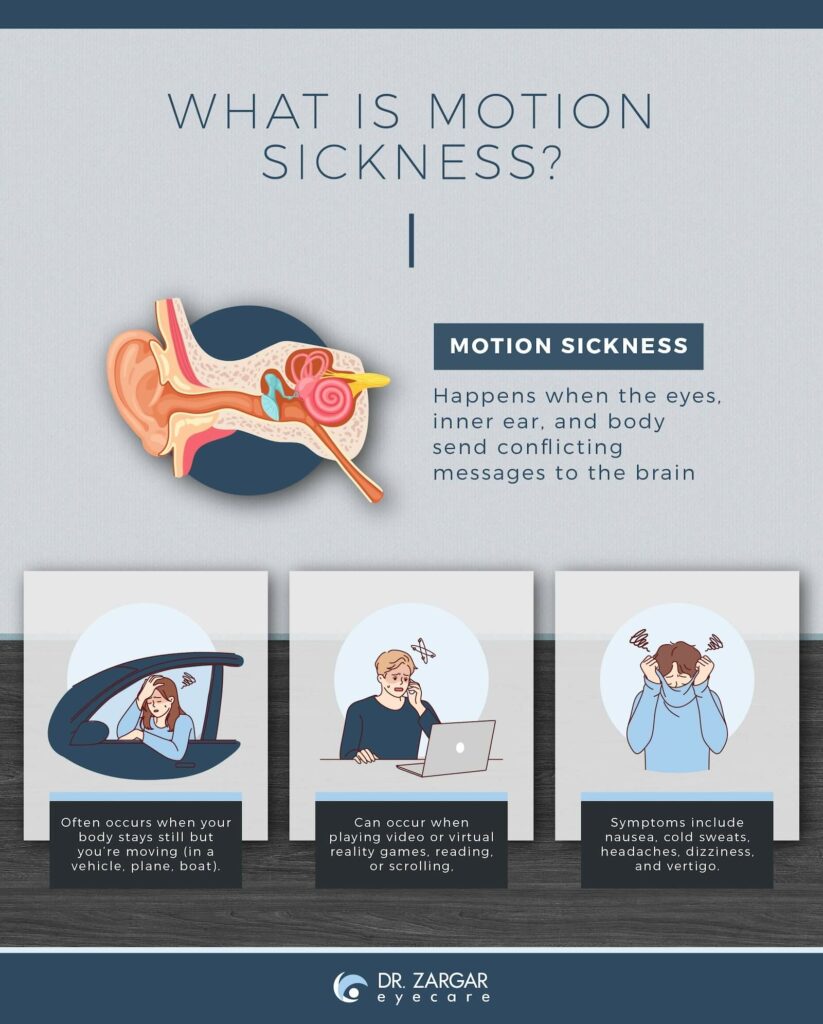Motion sickness affects people of all ages. While it’s often associated with travel, like car rides, flights, or boat trips, vision impairments or disruptions are sometimes at the root of the problem.
Vision problems can cause motion sickness by disrupting the processing of visual information, leading to a mismatch between what is seen and how it is perceived. If you feel motion sick with seemingly no cause, it could be due to your vision.
What Is Motion Sickness?
Motion sickness occurs when there is a disconnect between what the eyes observe and how the inner ear’s balance mechanism perceives motion, leading to confusion in the brain.
Symptoms often include:
- Nausea
- Vomiting
- Dizziness
- Sweating
What Causes Motion Sickness?
The primary cause of motion sickness is conflicting signals sent to your brain by your eyes, inner ears, and body. When these signals don’t match up, your brain struggles to make sense of the situation, resulting in unease and nausea.
Motion sickness is especially common when driving on winding roads, riding roller coasters, or flying in turbulent weather. Some other situations can include:
- Reading while traveling
- Sitting in the back of a car
- Being exposed to strong smells
- Having a history of migraines or inner ear problems

Is Motion Sickness the Same as Visual Vertigo?
While motion sickness stems from a mismatch between visual and vestibular (inner ear functions that control balance) inputs, visual vertigo specifically occurs when overwhelming or conflicting visual stimuli disrupt the brain’s ability to process motion.
Visual vertigo is characterized by dizziness and imbalance in response to certain visual environments, like watching fast-moving scenes or scrolling through digital content. This can be due to issues with the vestibular system or visual impairments.
Can Vision Problems Cause Motion Sickness?
Yes, vision problems can lead to motion sickness. If your eyes struggle to focus, or if there’s a disparity between the functions of your two eyes, your brain can receive mixed signals, leading to motion sickness symptoms. Visual vertigo can also be caused by vision problems.
Our bodies use visual, auditory, and vestibular systems to process our environments. Vision leads the charge here, doing much of the work to interpret our surroundings. If the visual system isn’t working correctly, you won’t be able to process the visual information accurately, causing a dizzy, spinny, or sometimes nauseating feeling.
Vision problems that cause motion sickness or visual vertigo can include:
- Incorrect or outdated prescriptions for glasses or contacts
- Trouble with eye teaming, focusing, or movement
- Eye misalignment, as with strabismus
- Imbalanced visual acuity, as with amblyopia
In general, binocular vision dysfunction (BVD) can cause motion sickness or visual vertigo. BVD is a term for various conditions that prevent your eyes and brain from working together. Strabismus and amblyopia are common forms of BVD.
Additionally, other factors can exacerbate symptoms of motion sickness and/or visual vertigo, including:
- Preexisting medical conditions
- Pregnancy
- History of migraines, vertigo, or vestibular disorders
- Low iron or vitamin deficiency
- Prescription medications
- Anxiety
- Age (younger children and older adults are often more susceptible)

Can Vision Therapy Help?
If you are struggling with motion sickness or visual vertigo symptoms, you should consult an optometrist and book a comprehensive eye exam. Optometrists can look for underlying vision problems that could be causing your motion sickness. After a proper diagnosis, your optometrist can recommend tools and treatments to help ease your symptoms.
Vision therapy can determine a program with tailored exercises and treatments to effectively address the visual problems contributing to motion sickness. Under the guidance of your optometrist, vision therapy can improve eye coordination and focus, reducing the frequency and severity of symptoms.
Vision therapy may include specialized equipment and computer-assisted exercises designed to strengthen the eye-brain connection, further alleviating motion sickness by enhancing visual processing and perception.
Through a personalized treatment plan, patients can develop better vestibular balance, which is crucial for minimizing disorientation and movement-related nausea. Over time, these targeted therapies not only reduce immediate discomfort but also contribute to long-term resilience against visual vertigo and motion sickness symptoms.
Other treatments your optometrist could recommend to reduce your symptoms may include:
- Vision Correction. Your optometrist can help determine if your eyewear prescription is up-to-date.
- Lenses or prisms. Certain glasses are designed to reduce the effects of functional eye problems, and your optometrist can work with you to find a suitable fit.
- Neurolens. Neurolens is specifically designed to correct eye misalignment and reduce visual stress, which can help alleviate motion sickness symptoms. Your optometrist can determine if Neurolens is right for you.
How to Prevent Motion Sickness
While there is no guaranteed way to prevent motion sickness, you can avoid motion sickness or alleviate symptoms through strategies like:
- Focusing on a fixed point. It can help to fix your gaze on a stable object, like the horizon or distant landmark. This gives your brain a reference point and helps reduce visual and vestibular confusion.
- Taking a break. If possible, take regular breaks during travel to get fresh air and stretch your legs. Frequent breaks can help prevent the onset of motion sickness.
- Limit reading or screen time. Reading or using tech in a moving vehicle can often trigger motion sickness, so it’s best to avoid it altogether. Similarly, staring at a screen for an extended period can also lead to symptoms.
- Try over-the-counter remedies. Several over-the-counter medications are specifically designed to alleviate symptoms of motion sickness. Be sure to consult with a doctor or pharmacist before taking any medication.
How Dr. Zargar Can Help
Motion sickness can be frustrating, but understanding its links to vision opens avenues for treatment and relief. Being mindful of your visual health and taking the necessary steps to maintain it can greatly reduce the impact of motion sickness on your life.If you suspect vision issues are contributing to your motion sickness, we recommend consulting with Dr. Zargar Eyecare about potential solutions. From vision therapy to comprehensive eye exams, we can find the solution for you. Book with us today to see how we can help.

